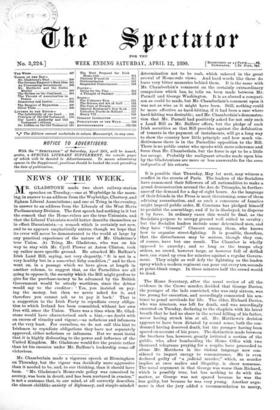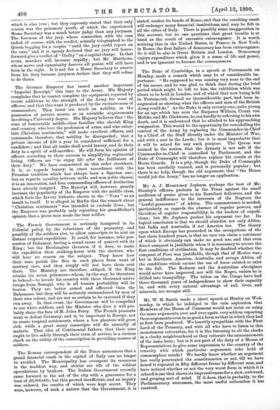The Home Secretary, after the usual review of all the
evidence in the Crewe murder, decided that George Davies, the younger of the lads convicted, who was only sixteen, was too young for execution, and accordingly commuted his sen- tence to penal servitude for life. The elder, Richard Davies, who was nineteen, was left for death, and was accordingly executed on Tuesday, declaring to the chaplain with his latest breath that he had no share in the actual killing of his father, never having struck him at all. Mr. Matthews's decision appears to have been dictated by sound sense, both the con- demned having deserved death, but the younger having been spared on account of his years. The distinction made between the brothers has, however, greatly irritated a section of the public, who, after bombarding the Home Office with two thousand telegrams praying for a respite, have proceeded to abuse Mr. Matthews in the violent language now con- sidered to impart energy to remonstrance. He is even declared guilty of "a judicial murder," which, as murder implies at once malice and illegality, is sheer nonsense. The usual argument is that George was worse than Richard, which is possibly true, but has nothing to do with the matter, as George was not spared because he was the less guilty, but because he was very young. Another argu- ment is that the jury added a recommendation to mercy,
which is also true ; but they expressly stated that their only reason was the prisoners' youth, of which the experienced Home Secretary was a much better judge than any juryman. The foreman of the jury, whose connection with the case ended, of course, with the verdict, actually telegraphed to the Queen begging for a respite "until the jury could report on the case," and it is openly declared that no jury will hence- forward give a verdict of " Guilty" on a capital charge. In that event, murders will increase rapidly ; but Mr. Matthews, whose nerve and equanimity deserve all praise, will still have been in the right. It is not for a Home Secretary to swerve from his duty because jurymen declare that they will refuse to do theirs.



































 Previous page
Previous page